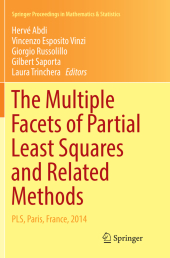 Neuerscheinungen 2018Stand: 2020-02-01 |
Schnellsuche
ISBN/Stichwort/Autor
|
Herderstraße 10
10625 Berlin
Tel.: 030 315 714 16
Fax 030 315 714 14
info@buchspektrum.de |

Hervé Abdi, Vincenzo Esposito Vinzi, Giorgio Russolillo, Gilbert Saporta, Laura Trinchera
(Beteiligte)
The Multiple Facets of Partial Least Squares and Related Methods
PLS, Paris, France, 2014
Herausgegeben von Abdi, Hervé; Esposito Vinzi, Vincenzo; Russolillo, Giorgio; Saporta, Gilbert; Trinchera, Laura
Softcover reprint of the original 1st ed. 2016. 2018. xiv, 316 S. 29 SW-Abb., 39 Farbabb., 40 Farbtabel
Verlag/Jahr: SPRINGER, BERLIN; SPRINGER INTERNATIONAL PUBLISHING 2018
ISBN: 3-319-82144-X (331982144X)
Neue ISBN: 978-3-319-82144-3 (9783319821443)
Preis und Lieferzeit: Bitte klicken
This volume presents state of the art theories, new developments, and important applications of Partial Least Square (PLS) methods. The text begins with the invited communications of current leaders in the field who cover the history of PLS, an overview of methodological issues, and recent advances in regression and multi-block approaches. The rest of the volume comprises selected, reviewed contributions from the 8th International Conference on Partial Least Squares and Related Methods held in Paris, France, on 26-28 May, 2014. They are organized in four coherent sections: 1) new developments in genomics and brain imaging, 2) new and alternative methods for multi-table and path analysis, 3) advances in partial least square regression (PLSR), and 4) partial least square path modeling (PLS-PM) breakthroughs and applications. PLS methods are very versatile methods that are now used in areas as diverse as engineering, life science, sociology, psychology, brain imaging, genomics, and business among both academics and practitioners. The selected chapters here highlight this diversity with applied examples as well as the most recent advances.
1. Partial Last Squares for Heterogeneous Data.- 2. On the PLS Algorithm for Multiple Regression (PLS1).- 3. Extending the Finite Iterative Method for Computing the Covariance Matrix Implied by a Recursive Path Model.- 4. Which Resampling-Based Error Estimator for Benchmark Studies? A Power Analysis with Application to PLS-LDA.- 5. Path Directions Incoherence in PLS Path Modeling: A Prediction-Oriented Solution.- 6. Imaging Genetics with Partial Least Squares for Mixed-Data Types (MiMoPLS).- 7. PLS and Functional Neuroimaging: Bias and Detection Power Across Different Resampling Schemes.- 8. Estimating and Correcting Optimism Bias in Multivariate PLS Regression: Application to the Study of the Association Between Single Nucleotide Polymorphisms and Multivariate Traits in Attention Deficit Hyperactivity Disorder.- 9. Discriminant Analysis for Multiway Data.- 10. Structured Variable Selection for Regularized Generalized Canonical Correlation Analysis.- 11. Supervised Component Generalized Linear Regression with Multiple Explanatory Blocks: THEME-SCGLR.- 12. Partial Possibilistic Regression Path Modeling.- 13. Assessment and Validation in Quantile Composite-Based Path Modeling.- 14. PLS-Frailty Model for Cancer Survival Analysis Based on Gene Expression Profiles.- 15. Functional Linear Regression Analysis Based on Partial Least Squares and Its Application.- 16. Multiblock and Multigroup PLS Application to Study Cannabis Consumption in Thirteen European Countries.- 17. A Unified Framework to Study the Properties of the PLS Vector of Regression Coefficients.- 18. A New Bootstrap-Based Stopping Criterion in PLS Components Construction.- 19. Extension to the PATHMOX Approach to Detect which Constructs Differentiate Segments and to Test Factor Invariance: Application to Mental Health Data.- 20. Multi-Group Invariance Testing: An Illustrative Comparison of PLS Permutation and Covariance-Based SEM Invariance Analysis.- 21. Brand Nostalgia and Consumers´ Relationships to Luxury Brands: A Continuous and Categorical Moderated Mediation Approach.- 22. A Partial Least Squares Algorithm Handling Ordinal Variables.


